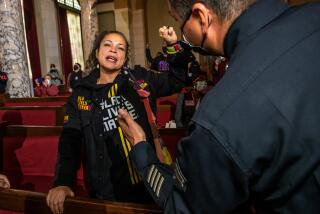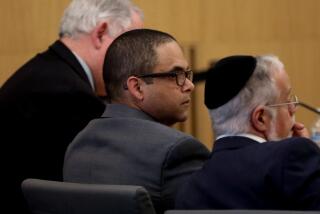Juror Says Panel Felt King Actions Were to Blame
In the end, the now-famous videotape--81 seconds of footage that shocked the world with its grainy images of a prone, seemingly defenseless Rodney G. King being clubbed by Los Angeles police officers--didn’t matter.
Instead, it was what King did before the camera started rolling that prompted a jury of six men and six women to return verdicts of not guilty in the celebrated trial of Officers Laurence M. Powell, Theodore J. Briseno, Timothy E. Wind and their sergeant, Stacey C. Koon.
“I know the film was horrible, but there’s a lot more to it than the film, and a lot more to it than the small pieces of film that were shown on TV,” said one juror interviewed by The Times. “The film does not show all of the things that went on before.”
The jury’s verdict proved to be a resounding endorsement of the police officers’ conduct. The juror--who spoke despite a pact reached by the 12 that they would not talk to the media--said the panel made the only decision it could have, based on the evidence presented. There was no wavering; it was not a close call.
The jury believed that if King had complied with orders from the police as they tried to arrest him, the beating would never have occurred.
“He refused to get out of the car,” said the juror, who asked not to be named. “His two companions got out of the car and complied with all the orders and he just continued to fight. So the Police Department had no alternative. He was obviously a dangerous person, massive size and threatening actions. . . . Mr. King was controlling the whole show with his actions.”
The prosecution’s decision not to put King on the witness stand may have hurt its case, the juror said, because King was not able to explain his actions:
“I wonder, could he have been a help to the case? Maybe he could have offered us some insight as to what his thinking was.”
The juror said that the panel found the officers’ testimony credible. Jurors did not believe race was a factor in the beating--if it had been, the juror said, King’s companions would have been beaten. Jurors also felt that the officers acted within the scope of LAPD regulations, and that the injuries to King’s head occurred as he fell to the ground, not--as the prosecution asserted--from the beating he received.
As for the officers, the juror said, they were justifiably in fear as they attempted to arrest King.
“They’re policemen, they’re not angels,” the juror said. “They’re out there to do a low-down dirty job. Would you want your husband doing it, or your son or your father?”
For the jurors, the deliberations were exhausting. The panel--none of them black--had been thrown together in their task after a painstaking, monthlong process of jury selection in which 248 other Ventura County residents were eliminated.
They represented all corners of society--a cable splicer, a bank clerk, a retired real estate broker. A phone company technician, a computer analyst, a housekeeper. A retired naval aviator, a park ranger, a college groundskeeper. A program manager, a retired mental health worker, a nurse. Throughout the trial, their identities had been a closely guarded secret, and upon its dramatic conclusion, they fought hard to keep it that way.
Although it had been reported that the jury concluded its deliberations Friday on all counts except the one that resulted in a mistrial, this juror said that was not the case. In fact, the final straw votes on all the counts were taken Wednesday. The jury spent “long and tedious hours” going over evidence in the case, looking at the videotape over and over, sometimes slowing it down so that it could be viewed frame by frame.
Count by count, the jurors examined the testimony and tried to reach conclusions. The discussion was emotional, but not volatile. The first straw vote came at the end of the second day of deliberations, and there were countless straw votes after that.
After all the facts had been reviewed, the only bitter debate revolved around a charge of assault under color of authority against Powell. On that count, the jury split 8 to 4 and the judge declared a mistrial. The four who voted for conviction believed that Powell should have stopped striking King sooner, according to the juror.
But on all the other counts, the jurors unanimously agreed that the officers did what they had to do to control King.
“Based upon the testimony, the evidence, the information that was provided to us, (the officers’ actions were) well within the scope of the Los Angeles Police Academy training,” the juror said. “They used everything that they had at their availability.”
While the jurors found the police officers’ testimony to be by and large credible, this juror said that the panel did not believe the comments of Briseno--who tried to distance himself from the other officers by saying the beating was wrong. Instead, Briseno was viewed as having turned against the other officers in an attempt to get himself acquitted.
“In the main, in the most part,” the juror said, “I feel that the officers were quite credible. When they were talking about the incident, and talking to us about what actually happened that night, you could see fear and you could see the stress of the whole situation. It had to be a very painful situation, very painful.”
As the juror spoke, rioters were tearing up the streets of Los Angeles in response to the verdict the panel had issued hours earlier. But the possibility that there might be a violent response to their decision did not--and could not--enter into the discussions, the juror said.
“That was not something that we would allow to go through our minds, simply because it could not be part of our equation. It was not part of the testimony, it was not part of the trial. Had we been thinking about that, we could have thought of the officers’ careers, and we couldn’t think of that either.”
From the Jurors
We, the jury in the case of the People vs. Powell et al., would like to make three things known. First, we would like to thank everyone involved for trying to make this whole experience for us as easy as possible. Second, we would like to ask all members of the media or anyone else who would want to contact us about this case, please do not. If we want to speak about it we will do so in our own time and in our own way. Finally, we would like to say that this experience has been an extremely difficult and stressful one, one which we have all agonized over a great deal. We feel we have done the best job we possibly could have done.
More to Read
Sign up for Essential California
The most important California stories and recommendations in your inbox every morning.
You may occasionally receive promotional content from the Los Angeles Times.










